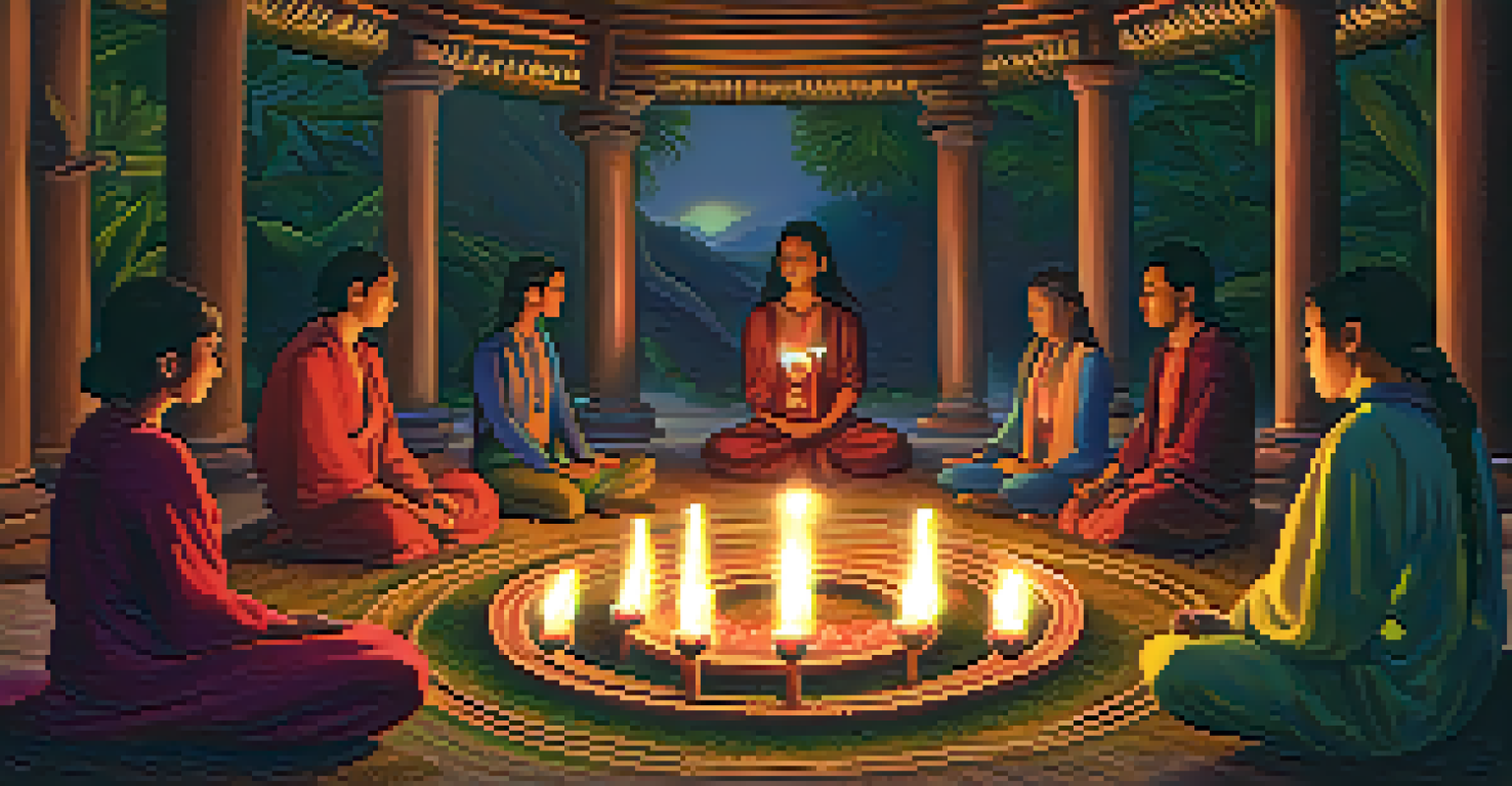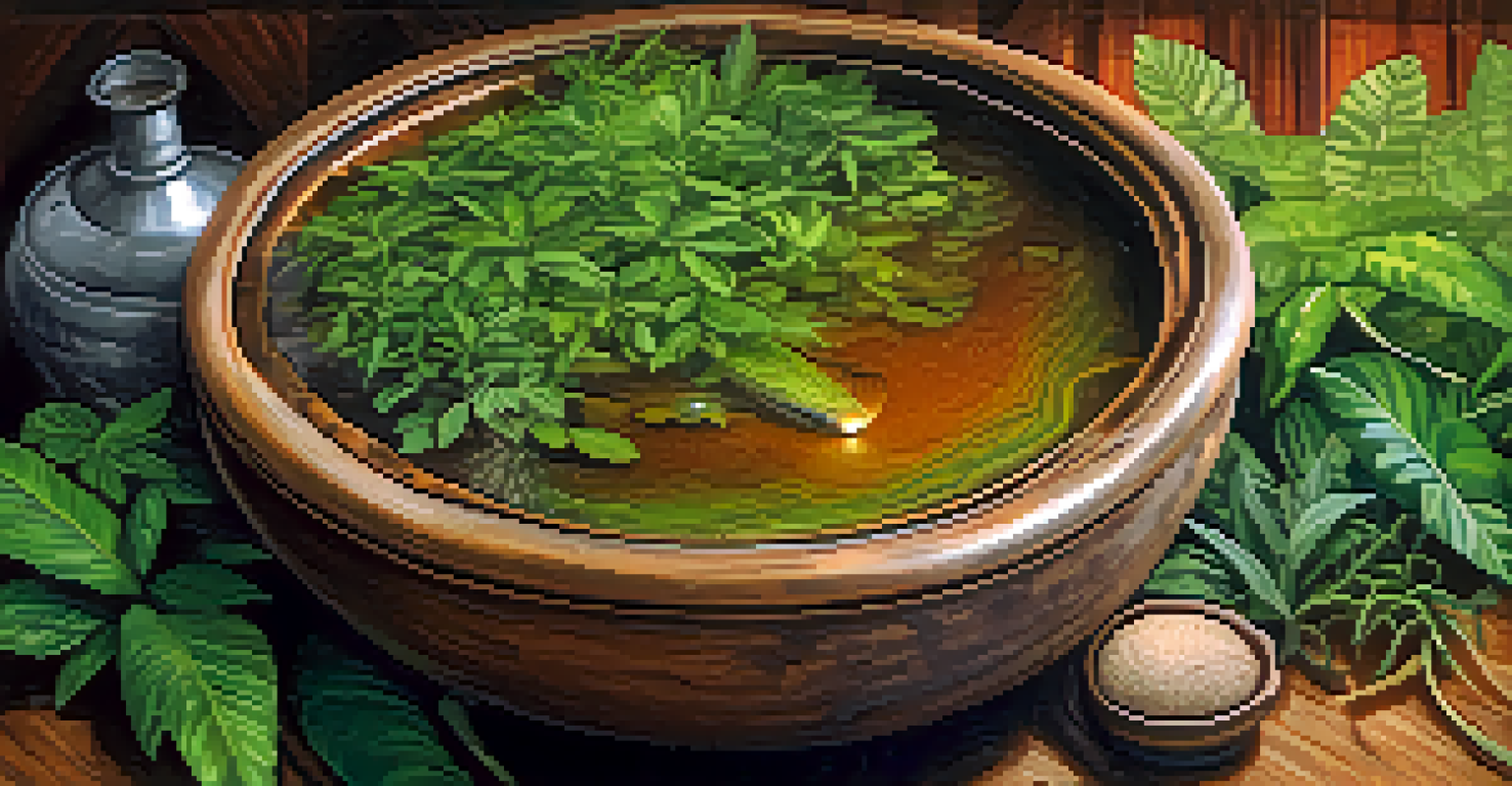Cultural Context of Ayahuasca: Science Meets Indigenous Wisdom

Understanding Ayahuasca: A Blend of Nature and Culture
Ayahuasca is a powerful brew made from the Banisteriopsis caapi vine and other plants, traditionally used by indigenous peoples of the Amazon. Its use spans centuries, deeply rooted in the spiritual and cultural practices of various tribes. This sacred drink facilitates profound experiences, often described as journeys into the self, highlighting the connection between nature, spirit, and community.
Ayahuasca is a tool for self-discovery and healing. It teaches us to reflect on our lives and to reconnect with the world around us.
Indigenous shamans, or healers, have long recognized Ayahuasca's potential for healing and insight. They believe that the brew opens a gateway to the spiritual world, enabling communication with ancestors and spirits. This perspective emphasizes the holistic understanding of health, which intertwines physical, mental, and spiritual well-being.
In recent years, the Western world has begun to take notice of Ayahuasca, blending traditional knowledge with modern scientific inquiry. This intersection raises fascinating questions about how ancient wisdom can inform contemporary approaches to mental health and personal growth.
The Science Behind Ayahuasca: What Research Tells Us
Scientific studies have started to uncover the biochemical impacts of Ayahuasca on the brain, revealing potential benefits for mental health issues like depression and PTSD. The primary psychoactive component, DMT (dimethyltryptamine), is thought to interact with serotonin receptors, leading to altered states of consciousness. These insights are paving the way for a better understanding of how such substances can affect our mental landscape.

Moreover, research has shown that Ayahuasca can promote neuroplasticity, the brain's ability to reorganize itself by forming new neural connections. This is particularly beneficial for individuals seeking to heal from trauma or addiction. By fostering new perspectives, Ayahuasca may help users break free from negative thought patterns and emotional burdens.
Ayahuasca's Healing Potential
Ayahuasca is believed to offer transformative healing experiences and insights, particularly for mental health issues like depression and PTSD.
However, it's crucial to approach these findings with caution. While the science is promising, the context in which Ayahuasca is consumed—often in ceremonial settings with experienced guides—plays a significant role in the overall experience and outcomes.
Cultural Significance: Ayahuasca in Indigenous Rituals
For indigenous communities, Ayahuasca is not merely a substance but a sacred tool used in rituals and ceremonies. These gatherings often involve singing, drumming, and storytelling, creating a rich tapestry of shared experiences that strengthen community bonds. Participants come together in a sacred space, fostering a sense of belonging and mutual support.
The future of healing will be the integration of ancient wisdom with modern science.
The rituals surrounding Ayahuasca serve various purposes, from healing physical ailments to seeking guidance and clarity in life. Shamans play a vital role, using their knowledge to guide participants through the experience, ensuring safety and respect for the plant's power. This communal aspect highlights the importance of tradition and spirituality in their culture.
As the interest in Ayahuasca grows globally, there is an ongoing dialogue about respecting these traditions. It's essential to honor the cultural heritage of indigenous people while exploring the benefits of Ayahuasca in modern contexts.
The Global Spread of Ayahuasca: A Double-Edged Sword
As Ayahuasca gains popularity outside its traditional settings, the implications are both exciting and concerning. Many people travel to South America to experience Ayahuasca in a ceremonial context, often seeking spiritual insight or therapeutic benefits. This growing interest has led to the establishment of numerous retreat centers, some run by indigenous practitioners and others by those outside the culture.
However, this global spread raises ethical questions about cultural appropriation and commercialization. Many indigenous communities worry that their sacred practices are being diluted or misrepresented for profit. Ensuring that these traditions are respected and that the rights of indigenous peoples are upheld is crucial in this evolving landscape.
Cultural Respect is Essential
As Ayahuasca gains global popularity, it is vital to honor and respect the indigenous traditions and communities that have safeguarded its usage for generations.
Moreover, the influx of Westerners can sometimes overshadow the voices of the very communities that have nurtured these practices for generations. Balancing respect for cultural origins with the desire for personal exploration is a challenge that needs thoughtful consideration.
Personal Journeys: Ayahuasca Experiences and Stories
Many individuals who partake in Ayahuasca ceremonies report transformative experiences that often lead to profound insights about themselves and their lives. These journeys can vary widely, from deeply challenging to incredibly uplifting, as participants confront personal traumas or rediscover lost passions. Each story is unique, reflecting the personal nature of the Ayahuasca experience.
For some, Ayahuasca serves as a catalyst for healing, enabling them to process emotions they have long buried. Others find clarity in their life’s purpose or experience a deep sense of connection to the universe and those around them. These narratives highlight the diverse ways Ayahuasca can impact individuals, showcasing its potential as a tool for personal growth.
However, it’s important to approach these stories with an understanding of the complexities involved. Not every experience is positive, and individuals should be prepared for the emotional challenges that can arise during the journey.
Safety and Preparation: Approaching Ayahuasca Responsibly
Before embarking on an Ayahuasca journey, proper preparation is essential. This includes both mental and physical readiness, as well as understanding the potential risks involved. Participants are often advised to follow a specific diet and avoid certain substances in the weeks leading up to the ceremony to ensure a safe experience.
Moreover, choosing the right environment and guide is crucial. Not all retreat centers or shamans provide the same level of care and respect for the tradition. Researching and selecting a reputable facilitator can help ensure that participants have a supportive and safe experience during their journey.
Navigating Personal Journeys
Participants often report diverse and profound personal journeys with Ayahuasca, underscoring the importance of preparation and understanding of potential challenges.
Ultimately, the goal is to approach Ayahuasca with respect and an open mind. Being aware of one’s intentions and maintaining a healthy dose of skepticism can lead to a more meaningful and beneficial experience.
The Future of Ayahuasca: Integrating Knowledge and Respect
As the conversation around Ayahuasca continues to grow, the future presents both opportunities and challenges. The blending of indigenous wisdom with modern science could lead to innovative therapeutic approaches, but it also requires a commitment to ethical practices. Respecting the origins of Ayahuasca and the communities that have safeguarded its secrets is paramount.
There’s a growing movement advocating for the rights of indigenous peoples and the protection of their cultural heritage. Efforts to ensure that these communities benefit from the global interest in Ayahuasca are essential in fostering a more equitable and respectful relationship. This includes supporting indigenous-led initiatives and promoting sustainable practices.

In conclusion, the journey of Ayahuasca is a complex interplay of ancient tradition and contemporary exploration. By honoring its cultural significance and integrating scientific insights, we can create a future that respects both the wisdom of the past and the needs of the present.